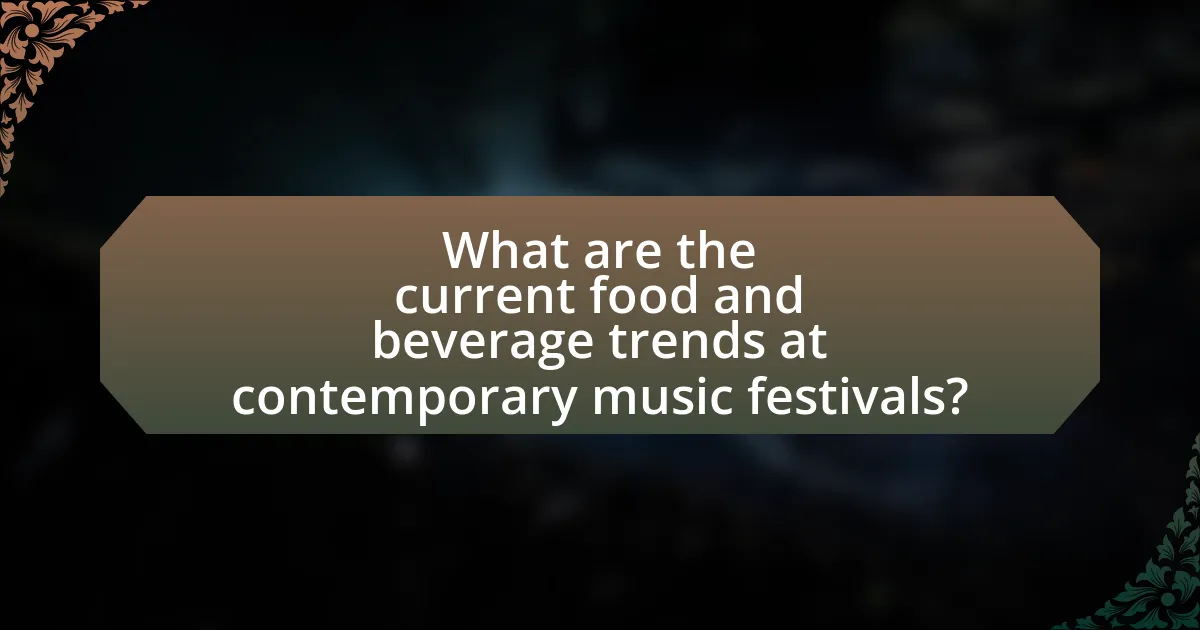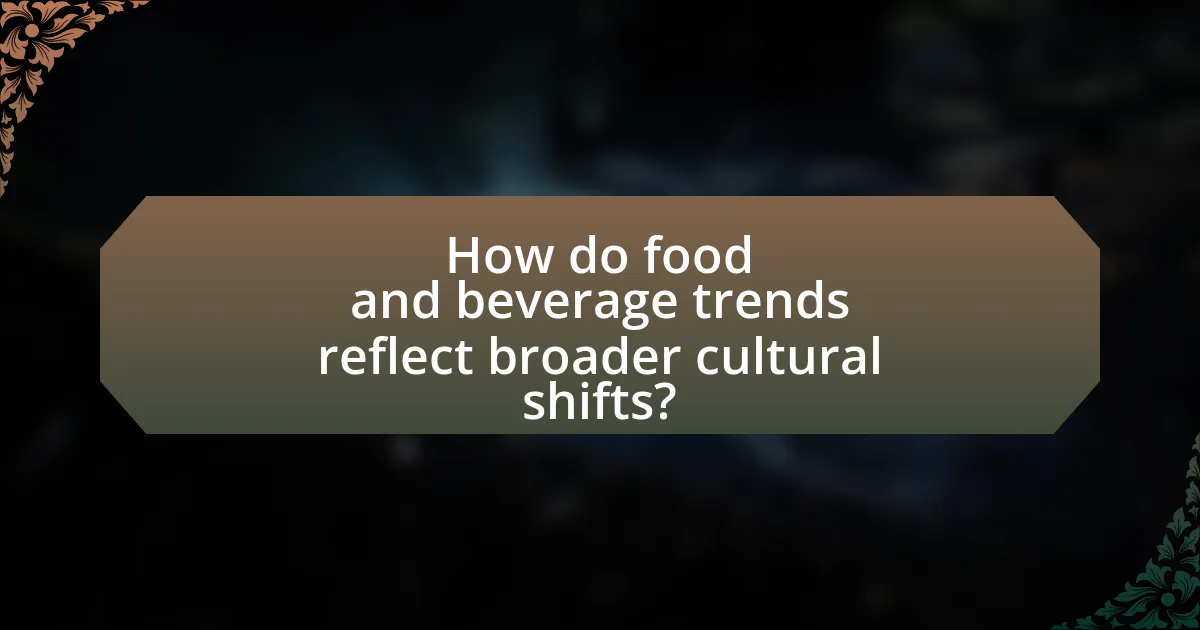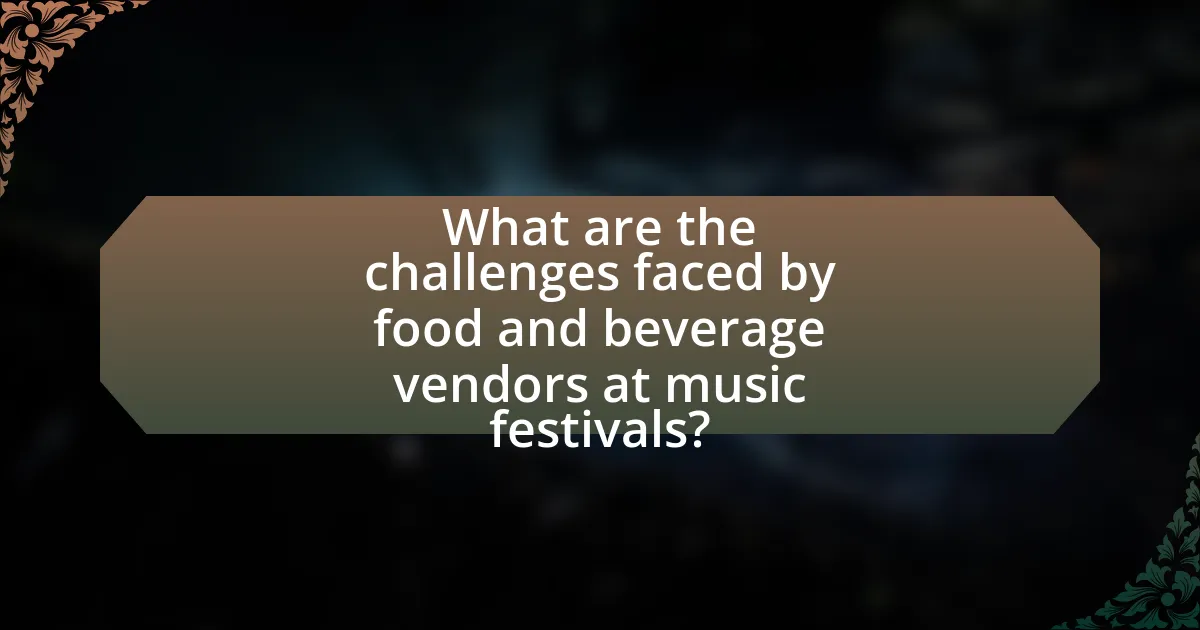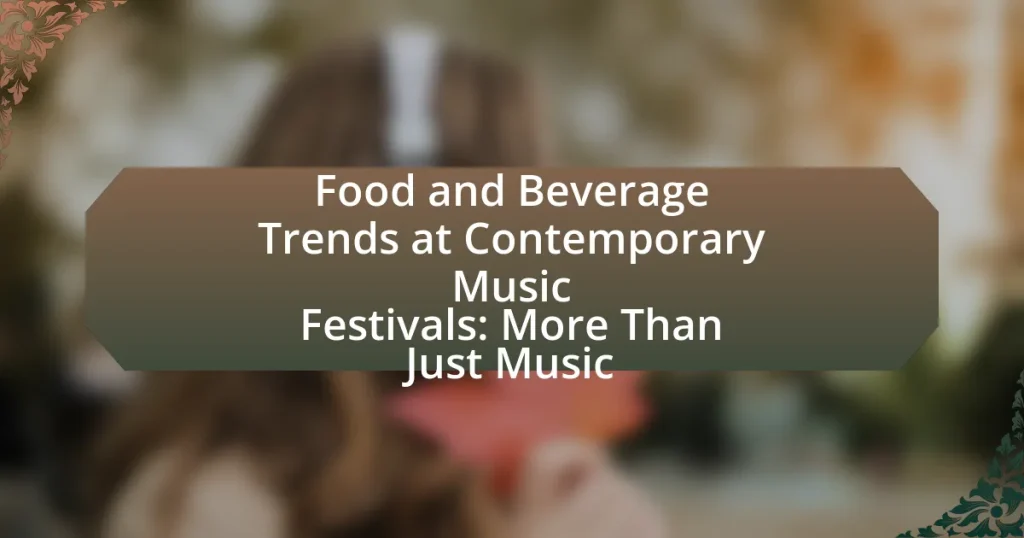The article focuses on the evolving food and beverage trends at contemporary music festivals, highlighting the increasing demand for plant-based options, local sourcing, and experiential dining. It examines how these trends reflect broader cultural shifts towards sustainability and health consciousness, as well as the impact of dietary restrictions on menu choices. Additionally, the article discusses the role of local cuisine, the significance of sustainability practices, and the challenges faced by vendors in a competitive environment. It also explores how innovations in service and marketing strategies can enhance the overall festival experience for attendees.

What are the current food and beverage trends at contemporary music festivals?
Current food and beverage trends at contemporary music festivals include a focus on plant-based options, local sourcing, and experiential dining. Many festivals are increasingly offering vegan and vegetarian dishes to cater to the growing demand for sustainable and health-conscious eating, with reports indicating that plant-based food sales have surged by 27% in recent years. Additionally, local sourcing of ingredients is becoming a priority, as festivals aim to support regional farmers and reduce their carbon footprint. Experiential dining, such as interactive food stations and gourmet food trucks, enhances the festival experience, allowing attendees to engage with their food in unique ways. These trends reflect a broader shift towards sustainability and culinary innovation in the festival scene.
How have food and beverage offerings evolved at music festivals?
Food and beverage offerings at music festivals have significantly evolved to include diverse, high-quality options that cater to various dietary preferences. Historically, festivals primarily featured standard fare like hot dogs and burgers; however, recent trends show a shift towards gourmet food trucks, local artisanal vendors, and health-conscious choices such as vegan and gluten-free options. For instance, festivals like Coachella and Lollapalooza now showcase a wide range of cuisines, reflecting global culinary trends and emphasizing sustainability. This evolution is supported by the growing demand for unique culinary experiences among festival-goers, with a 2019 report indicating that 70% of attendees prioritize food quality when choosing which festivals to attend.
What role does local cuisine play in festival food selections?
Local cuisine significantly influences festival food selections by reflecting regional culture and traditions. Festivals often showcase local dishes, allowing attendees to experience the unique flavors and culinary practices of the area. This connection to local cuisine enhances the festival experience, as it promotes community identity and supports local food producers. For instance, a study by the National Endowment for the Arts highlights that food offerings at festivals often include traditional recipes and ingredients sourced from nearby farms, thereby fostering a sense of place and authenticity.
How are dietary restrictions influencing menu choices?
Dietary restrictions significantly influence menu choices by prompting food vendors to offer diverse options that cater to various dietary needs, such as vegan, gluten-free, and allergen-free selections. This shift is driven by the increasing awareness of health and wellness among festival-goers, with studies indicating that approximately 30% of consumers actively seek out food that aligns with their dietary preferences. As a result, contemporary music festivals are adapting their menus to include plant-based proteins, organic ingredients, and clearly labeled allergen information, ensuring that all attendees can enjoy the culinary experience without compromising their dietary requirements.
Why is sustainability important in festival food and beverage trends?
Sustainability is important in festival food and beverage trends because it addresses environmental concerns and consumer demand for eco-friendly practices. Festivals generate significant waste and carbon emissions, with food and beverage operations contributing heavily to these issues. According to a report by the Green Music Initiative, festivals can produce up to 1,000 tons of waste, highlighting the need for sustainable practices. Implementing sustainable sourcing, reducing single-use plastics, and promoting local food can minimize environmental impact and enhance the festival experience for attendees who increasingly prioritize sustainability in their purchasing decisions.
What practices are festivals adopting to reduce waste?
Festivals are adopting practices such as implementing reusable cup systems, offering plant-based food options, and enhancing recycling and composting programs to reduce waste. For instance, many festivals have introduced deposit systems for reusable cups, which significantly decreases single-use plastic waste; studies show that this can reduce waste by up to 80%. Additionally, the promotion of plant-based food options not only lowers the carbon footprint associated with meat production but also aligns with sustainability goals. Enhanced recycling and composting initiatives ensure that organic waste is diverted from landfills, with some festivals achieving diversion rates of over 70%. These practices collectively contribute to a more sustainable festival experience.
How are vendors sourcing ingredients sustainably?
Vendors are sourcing ingredients sustainably by prioritizing local and organic produce, which reduces transportation emissions and supports local economies. Many vendors establish direct relationships with farmers to ensure that their ingredients are grown using environmentally friendly practices, such as crop rotation and reduced pesticide use. For instance, a study by the Food and Agriculture Organization indicates that sourcing locally can cut carbon footprints by up to 50%. Additionally, some vendors are adopting practices like seasonal menus that align with the availability of local ingredients, further promoting sustainability.
What impact do food and beverage trends have on the overall festival experience?
Food and beverage trends significantly enhance the overall festival experience by creating a more immersive and enjoyable atmosphere for attendees. These trends often reflect cultural shifts and consumer preferences, leading to diverse culinary offerings that cater to various dietary needs and tastes. For instance, the rise of plant-based options and local sourcing not only appeals to health-conscious festival-goers but also supports sustainability efforts, which are increasingly important to modern audiences. According to a 2022 report by the National Association of Specialty Food Trade, 70% of consumers are more likely to attend events that feature local and artisanal food options, demonstrating that food and beverage choices can directly influence attendance and satisfaction levels at festivals.
How do food and beverage options affect attendee satisfaction?
Food and beverage options significantly impact attendee satisfaction at events. Diverse and high-quality food and beverage offerings enhance the overall experience, leading to higher satisfaction levels among attendees. Research indicates that 70% of festival-goers consider food quality as a crucial factor in their overall enjoyment, with many willing to pay more for better options. Additionally, the availability of various dietary choices, such as vegetarian, vegan, and gluten-free options, caters to a broader audience, further increasing satisfaction. Events that prioritize food and beverage quality often see increased attendance and positive feedback, reinforcing the importance of these offerings in enhancing the attendee experience.
What role does social media play in promoting festival food trends?
Social media plays a crucial role in promoting festival food trends by providing a platform for sharing visually appealing content that captures audience attention. Platforms like Instagram and TikTok allow festival-goers and food vendors to showcase unique dishes, creating viral trends that influence consumer preferences. For instance, the rise of food items like rainbow bagels and gourmet grilled cheese sandwiches can be traced back to social media exposure, where visually striking images and videos encourage sharing and engagement. This phenomenon is supported by research indicating that 79% of consumers are influenced by social media when making food choices, highlighting the significant impact of these platforms on food trends at festivals.

How do food and beverage trends reflect broader cultural shifts?
Food and beverage trends reflect broader cultural shifts by serving as indicators of societal values, preferences, and changes in lifestyle. For instance, the rise of plant-based diets in recent years mirrors a growing awareness of health, environmental sustainability, and animal welfare among consumers. According to a report by the Plant Based Foods Association, the plant-based food market grew by 27% in 2020, highlighting a significant cultural shift towards more sustainable eating habits. Additionally, the increasing popularity of craft beverages, such as local beers and artisanal spirits, signifies a cultural movement towards supporting local economies and valuing unique, authentic experiences. This trend is evidenced by the 2021 Brewers Association report, which noted that 23% of U.S. adults prefer craft beer over mass-produced options, reflecting a desire for individuality and community connection. Thus, food and beverage trends not only satisfy consumer demands but also encapsulate the evolving cultural landscape.
What cultural influences are shaping festival food choices?
Cultural influences shaping festival food choices include globalization, regional culinary traditions, and dietary trends. Globalization has led to the fusion of diverse cuisines, allowing festival-goers to experience a variety of international flavors. For instance, food trucks at festivals often feature a mix of Asian, Latin American, and Mediterranean dishes, reflecting the multicultural makeup of attendees. Regional culinary traditions also play a significant role, as festivals often highlight local ingredients and dishes, promoting community identity and pride. Additionally, dietary trends such as veganism and gluten-free options are increasingly incorporated into festival menus, catering to health-conscious consumers and ethical considerations. This shift is supported by data indicating that 39% of millennials prefer plant-based options, influencing vendors to adapt their offerings accordingly.
How are global cuisines being integrated into festival menus?
Global cuisines are being integrated into festival menus by offering diverse food options that reflect various cultural traditions and culinary practices. Festivals are increasingly collaborating with international chefs and local food vendors to create a multicultural dining experience, showcasing dishes from regions such as Asia, Latin America, and the Mediterranean. This trend is supported by consumer demand for unique and authentic food experiences, as evidenced by a 2022 survey indicating that 70% of festival-goers prefer food options that represent different cultures. Additionally, festivals are incorporating food trucks and pop-up stalls that specialize in global cuisines, enhancing accessibility and variety for attendees.
What trends in health and wellness are impacting festival offerings?
Health and wellness trends significantly impacting festival offerings include the rise of plant-based diets, increased demand for organic and locally sourced food, and a focus on mental well-being through mindfulness activities. Festivals are increasingly incorporating vegan and vegetarian options to cater to health-conscious attendees, reflecting a broader societal shift towards sustainable eating. Additionally, the emphasis on organic ingredients aligns with consumer preferences for clean eating, as evidenced by a 2022 report from the Organic Trade Association, which noted a 12% increase in organic food sales. Furthermore, festivals are integrating wellness activities such as yoga sessions and meditation spaces, recognizing the importance of mental health in the overall festival experience. This holistic approach to health and wellness is reshaping how festivals curate their food and beverage offerings, making them more inclusive and health-oriented.
Why are craft beverages gaining popularity at music festivals?
Craft beverages are gaining popularity at music festivals due to their unique flavors and artisanal appeal, which enhance the overall festival experience. Attendees increasingly seek distinctive and high-quality options that reflect local culture and craftsmanship, moving away from mass-produced drinks. According to a 2022 survey by the Brewers Association, 70% of festival-goers expressed a preference for craft beer over mainstream brands, highlighting a growing trend towards supporting local breweries and enjoying diverse beverage choices. This shift aligns with the broader consumer movement towards authenticity and sustainability in food and drink, making craft beverages a fitting choice for the vibrant atmosphere of music festivals.
What types of craft beverages are most commonly featured?
Craft beverages most commonly featured at contemporary music festivals include craft beer, artisanal cocktails, and specialty wines. Craft beer is particularly popular due to its diverse styles and local production, often highlighting regional breweries. Artisanal cocktails are crafted with unique ingredients and local spirits, appealing to festival-goers seeking innovative flavors. Specialty wines, including organic and biodynamic options, cater to a growing interest in sustainable and high-quality wine selections. These trends reflect the increasing demand for unique and locally sourced beverages at such events.
How do craft beverages enhance the festival atmosphere?
Craft beverages enhance the festival atmosphere by creating a unique and immersive experience that fosters social interaction and community engagement. These beverages, often locally sourced and artisanal, contribute to the festival’s identity and appeal, attracting attendees who appreciate quality and craftsmanship. Research indicates that festivals featuring craft beverages can increase attendee satisfaction and prolong their stay, as participants are drawn to the diverse flavors and the opportunity to connect with local producers. This connection not only enriches the overall experience but also supports local economies, reinforcing the festival’s role as a cultural and social hub.
How are festivals adapting to changing consumer preferences?
Festivals are adapting to changing consumer preferences by diversifying their food and beverage offerings to include healthier, locally sourced, and sustainable options. This shift is driven by a growing consumer demand for organic and plant-based foods, as evidenced by a 2021 report from the International Music Summit, which noted that 70% of festival-goers prefer events that prioritize sustainability. Additionally, festivals are incorporating technology, such as mobile ordering and cashless payment systems, to enhance convenience and streamline the consumer experience. This adaptation not only meets the evolving tastes of attendees but also aligns with broader trends in health consciousness and environmental awareness.
What innovations are being introduced in food and beverage service?
Innovations in food and beverage service at contemporary music festivals include the integration of technology, such as mobile ordering apps and contactless payment systems, which enhance customer convenience and reduce wait times. Additionally, there is a growing trend towards sustainability, with many festivals introducing plant-based menus and eco-friendly packaging to minimize environmental impact. Data from the National Restaurant Association indicates that 60% of consumers are more likely to choose a restaurant that offers sustainable options, reflecting a shift in consumer preferences. Furthermore, experiential dining concepts, such as interactive food stations and chef-led demonstrations, are being implemented to create memorable experiences for festival-goers. These innovations collectively aim to improve service efficiency, cater to evolving consumer demands, and promote sustainability within the food and beverage sector at music festivals.
How are festivals responding to the rise of food trucks and pop-up vendors?
Festivals are increasingly incorporating food trucks and pop-up vendors to enhance the culinary experience for attendees. This shift allows festivals to offer diverse food options, catering to various dietary preferences and trends, which is essential in attracting a broader audience. For instance, many festivals now allocate specific areas for food trucks, creating a vibrant food marketplace that complements the music and entertainment. Additionally, the flexibility of pop-up vendors enables festivals to feature local and seasonal cuisine, fostering community engagement and supporting local businesses. This trend is supported by data indicating that festivals with diverse food offerings see higher attendance and satisfaction rates among festival-goers.

What are the challenges faced by food and beverage vendors at music festivals?
Food and beverage vendors at music festivals face several challenges, including high competition, logistical issues, and regulatory compliance. High competition arises from the presence of numerous vendors, making it difficult for individual businesses to attract customers. Logistical issues include managing inventory, ensuring timely food preparation, and maintaining quality under pressure, especially during peak hours. Regulatory compliance involves adhering to health and safety standards, which can vary by location and require vendors to obtain necessary permits. These challenges can significantly impact the profitability and operational efficiency of food and beverage vendors at music festivals.
How do logistical issues impact food and beverage service at festivals?
Logistical issues significantly impact food and beverage service at festivals by affecting supply chain efficiency, vendor coordination, and customer satisfaction. For instance, delays in food delivery can lead to shortages, resulting in long wait times and reduced menu options for attendees. Additionally, inadequate infrastructure, such as insufficient power supply or water access, can hinder food preparation and service, ultimately diminishing the overall festival experience. A study by the National Association of Concessionaires highlights that effective logistical planning can increase sales by up to 30% during events, demonstrating the critical role logistics play in optimizing food and beverage service at festivals.
What are the common supply chain challenges vendors encounter?
Vendors commonly encounter challenges in supply chain management such as inventory management, demand forecasting, and logistics coordination. Inventory management issues arise from fluctuations in demand during festivals, leading to either surplus or shortages of food and beverages. Demand forecasting is complicated by the unpredictable nature of festival attendance, making it difficult for vendors to accurately predict the quantity of supplies needed. Logistics coordination challenges include timely delivery of perishable goods and managing transportation logistics in crowded festival environments. These challenges are critical as they directly impact vendor profitability and customer satisfaction at events.
How do weather conditions affect food and beverage sales?
Weather conditions significantly influence food and beverage sales at contemporary music festivals. For instance, warm and sunny weather typically leads to increased sales as attendees are more likely to purchase cold beverages and outdoor food options. Conversely, adverse weather conditions such as rain or cold temperatures can deter festival-goers, resulting in decreased sales. A study by the National Restaurant Association found that 70% of consumers are less likely to dine outdoors during inclement weather, highlighting the direct correlation between weather and consumer behavior in food and beverage purchases.
What regulations must vendors comply with at music festivals?
Vendors at music festivals must comply with health and safety regulations, food handling standards, and local licensing requirements. Health regulations typically include obtaining food safety permits, ensuring proper food storage and preparation practices, and adhering to sanitation guidelines set by local health departments. Additionally, vendors must secure necessary permits for selling food and beverages, which may involve inspections and compliance with fire safety codes. Local regulations can vary significantly, so vendors must be aware of specific requirements in the festival’s location to operate legally and safely.
How do health and safety regulations influence vendor operations?
Health and safety regulations significantly influence vendor operations by establishing mandatory standards that ensure food safety and worker protection. These regulations require vendors to implement practices such as proper food handling, sanitation, and employee training to minimize health risks. For instance, the Food and Drug Administration (FDA) mandates that food vendors adhere to the Food Code, which outlines safe food preparation and storage methods. Compliance with these regulations not only protects consumers from foodborne illnesses but also enhances vendor credibility and operational efficiency, as adherence can lead to fewer inspections and potential fines.
What licensing requirements are necessary for food and beverage vendors?
Food and beverage vendors must obtain various licenses to operate legally, including a food service license, health department permits, and potentially a liquor license if alcohol is served. The food service license ensures compliance with local health and safety regulations, while health department permits verify that vendors meet sanitation standards. Additionally, a liquor license is required in most jurisdictions for the sale of alcoholic beverages, which involves a separate application process and adherence to specific regulations. These licensing requirements are enforced to protect public health and ensure safe food handling practices at events like music festivals.
What strategies can vendors use to succeed in a competitive festival environment?
Vendors can succeed in a competitive festival environment by offering unique and high-quality food and beverage options that cater to diverse dietary preferences. This strategy is supported by the growing trend of consumers seeking artisanal, locally sourced, and health-conscious choices at festivals, as evidenced by a 2022 report from the National Association of Concessionaires, which highlighted that 70% of festival-goers prioritize food quality over price. Additionally, effective branding and engaging presentation can attract customers, as visually appealing setups have been shown to increase sales by up to 30%. Implementing efficient service practices, such as mobile ordering and quick payment systems, can also enhance customer experience, leading to repeat business and positive word-of-mouth.
How can vendors effectively market their offerings to festival-goers?
Vendors can effectively market their offerings to festival-goers by utilizing targeted social media campaigns, engaging visual displays, and strategic partnerships with festival organizers. Targeted social media campaigns allow vendors to reach festival-goers before the event, generating buzz and anticipation. Engaging visual displays attract attention on-site, enhancing the overall festival experience and encouraging impulse purchases. Strategic partnerships with festival organizers can provide vendors with prime locations and promotional opportunities, increasing visibility and foot traffic. According to a study by Eventbrite, 78% of festival attendees are influenced by social media when deciding what to purchase at events, highlighting the importance of these marketing strategies.
What best practices should vendors follow to enhance customer experience?
Vendors should prioritize customer engagement and satisfaction to enhance the customer experience at contemporary music festivals. This can be achieved by offering diverse food and beverage options that cater to various dietary preferences, ensuring high-quality products, and maintaining efficient service. For instance, a study by the National Restaurant Association indicates that 70% of consumers are more likely to return to a vendor that offers healthy options. Additionally, implementing technology such as mobile ordering can streamline the purchasing process, reducing wait times and improving overall satisfaction. By focusing on these best practices, vendors can create a memorable experience that encourages repeat attendance at festivals.
